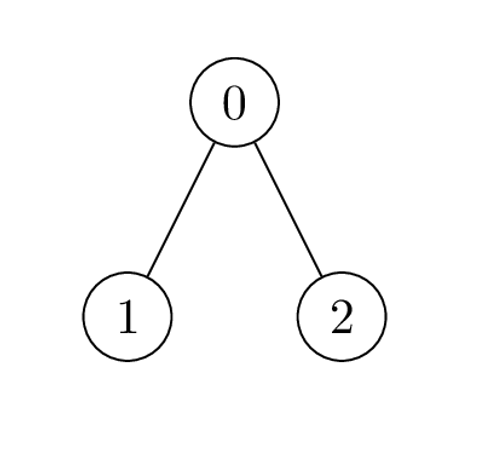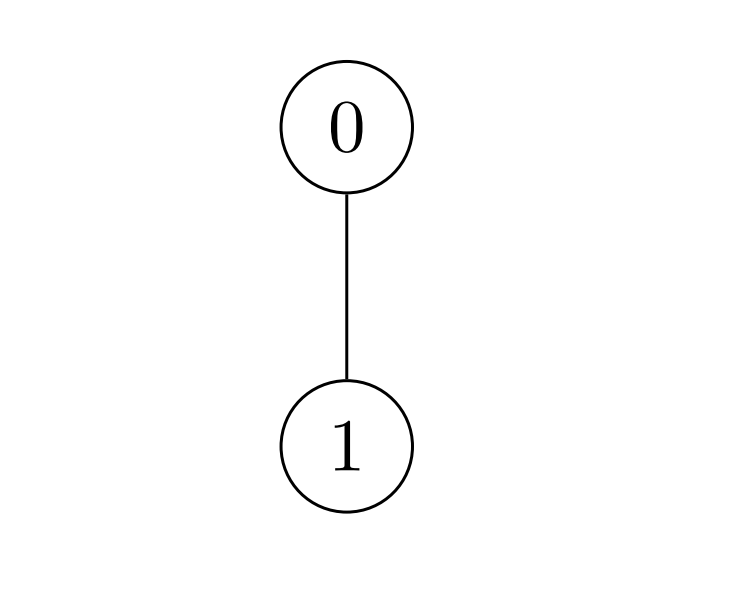3068. Find the Maximum Sum of Node Values
Description
There exists an undirected tree with n nodes numbered 0 to n - 1. You are given a 0-indexed 2D integer array edges of length n - 1, where edges[i] = [ui, vi] indicates that there is an edge between nodes ui and vi in the tree. You are also given a positive integer k, and a 0-indexed array of non-negative integers nums of length n, where nums[i] represents the value of the node numbered i.
Alice wants the sum of values of tree nodes to be maximum, for which Alice can perform the following operation any number of times (including zero) on the tree:
- Choose any edge
[u, v]connecting the nodesuandv, and update their values as follows:nums[u] = nums[u] XOR knums[v] = nums[v] XOR k
Return the maximum possible sum of the values Alice can achieve by performing the operation any number of times.
Example 1:
Input: nums = [1,2,1], k = 3, edges = [[0,1],[0,2]] Output: 6 Explanation: Alice can achieve the maximum sum of 6 using a single operation: - Choose the edge [0,2]. nums[0] and nums[2] become: 1 XOR 3 = 2, and the array nums becomes: [1,2,1] -> [2,2,2]. The total sum of values is 2 + 2 + 2 = 6. It can be shown that 6 is the maximum achievable sum of values.
Example 2:
Input: nums = [2,3], k = 7, edges = [[0,1]] Output: 9 Explanation: Alice can achieve the maximum sum of 9 using a single operation: - Choose the edge [0,1]. nums[0] becomes: 2 XOR 7 = 5 and nums[1] become: 3 XOR 7 = 4, and the array nums becomes: [2,3] -> [5,4]. The total sum of values is 5 + 4 = 9. It can be shown that 9 is the maximum achievable sum of values.
Example 3:
Input: nums = [7,7,7,7,7,7], k = 3, edges = [[0,1],[0,2],[0,3],[0,4],[0,5]] Output: 42 Explanation: The maximum achievable sum is 42 which can be achieved by Alice performing no operations.
Constraints:
2 <= n == nums.length <= 2 * 1041 <= k <= 1090 <= nums[i] <= 109edges.length == n - 1edges[i].length == 20 <= edges[i][0], edges[i][1] <= n - 1- The input is generated such that
edgesrepresent a valid tree.
Solutions
Solution 1: Dynamic Programming
For any number \(x\), its value remains unchanged after being XORed with \(k\) an even number of times. Therefore, for any path in a tree, if we perform the operation on all edges in the path, the values of all nodes on the path except the start and end nodes will not change.
Additionally, no matter how many operations are performed, there will always be an even number of elements XORed with \(k\), and the remaining elements will remain unchanged.
Thus, the problem is transformed into: for the array \(\textit{nums}\), select an even number of elements to XOR with \(k\) to maximize the sum.
We can use dynamic programming to solve this problem. Let \(f_0\) represent the maximum sum when an even number of elements have been XORed with \(k\), and \(f_1\) represent the maximum sum when an odd number of elements have been XORed with \(k\). The state transition equations are:
where \(x\) represents the current element's value.
We traverse the array \(\textit{nums}\) and update \(f_0\) and \(f_1\) according to the above state transition equations. Finally, we return \(f_0\).
The time complexity is \(O(n)\), where \(n\) is the length of the array \(\textit{nums}\). The space complexity is \(O(1)\).
1 2 3 4 5 6 | |
1 2 3 4 5 6 7 8 9 10 11 | |
1 2 3 4 5 6 7 8 9 10 11 12 | |
1 2 3 4 5 6 7 | |
1 2 3 4 5 6 7 | |
1 2 3 4 5 6 7 8 9 10 11 12 13 14 | |
1 2 3 4 5 6 7 8 9 10 11 | |





